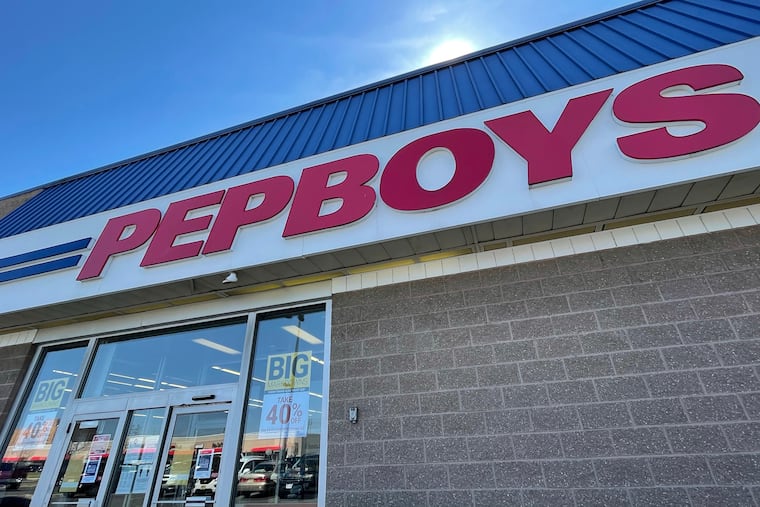Pep Boys is closing more stores, including in South Jersey
Pep Boys has been selling or shutting retail stores in South Jersey and elsewhere to focus on tires and repairs.

Pep Boys — Manny Moe & Jack, the iconic Philadelphia company that is marking its 100th year keeping drivers on the road — continues to close its familiar auto parts stores, as owner Icahn Enterprises shifts out of retail to concentrate on repairs and tire sales, employees say.
Staff at the company’s Cherry Hill and Marlton locations in South Jersey say they were told earlier this week that those stores will close this summer, though garages and tires will remain. A Pep Boys in Turnersville is also expected to close. Stores in Audubon and Stratford closed earlier this year. Stores in Cinnaminson and Berlin will stay open, employees said.
Pep Boys locations in Philadelphia, Wilmington and their suburbs have so far remained in business, along with attached Pep Boys garages and tire outlets, though some of the retail stores have cut operating hours, for example closing at 7 p.m. instead of 9 p.m.
The chain’s retail stores in the Rio Grande Valley of South Texas are also set to close, the Valley Morning Star reported May 5. In all, an additional 100 stores around the United States are slated for closure or sale to other owners, according to a Pep Boys management official who spoke on condition that he not be identified.
That’s in addition to 109 Western stores that the company said in March will be taken over by rival Advance Auto Parts during the course of this year.
Pep Boys has also closed clusters of stores in the Detroit, Pittsburgh and Seattle areas, and in New Mexico and Louisiana, among other states, since early last year. The company, whose managers are now scattered among several cities, sold its headquarters at 3111 W. Allegheny Ave. in Upper North Philadelphia to a group of real estate investors last fall but continues to occupy part of it.
Icahn, which once operated more than 500 Pep Boys retail stores and a larger number of garages, has stopped publishing current store counts.
Besides the stores closing, “there are additional retail stores closing to prepare for conversion to another retailer,” said Arianna Sherlock, spokeswoman for the company. She said Pep Boys now operates about 1,000 service centers, including several newly opened, and plans to open more later this year. She would not provide a number for the remaining retail stores.
The company’s retail auto parts sales tumbled by $50 million, to $276 million, in the first three months of this year, compared with a year ago, its report shows.
Most of the drop was due to store closings “in low-volume, non-core markets,” which left Pep Boys less unprofitable, Keith Cozza, chief executive of Florida-based Icahn Enterprises, told investors at an April conference. Store closings speeded up, he said, because of the pandemic, which reduced commuting, tourism and car demand last year.
Auto servicing income rose during the same period, by around $13 million, to $322 million, eclipsing retail sales. Even with lower store sales, “you should see dramatic improvement in profitability,” thanks to digital technology that speeds parts to where they are needed and makes it easier to set service and tire appointments, Cozza added.
Pep Boys was founded by four World War I Navy veterans with an initial store at 63rd and Market Streets where West Philadelphia met the growing auto-friendly suburbs. The company grew up with the nation’s personal-vehicle obsession. But as a public company, in recent decades Pep Boys struggled to show the growth needed to keep profits and share prices high and avoid a takeover.
In 2016, billionaire takeover specialist Carl Icahn, whose interests range from casinos to energy utilities, bought Pep Boys for $1 billion, outbidding Japanese-American tiremaker BridgestoneFirestone.
Icahn hoped to weld Pep Boys with other auto chains he bought including Montgomery County-based transmission shop specialist Aamco and his auto parts manufacturing plants to create a profitable transportation group.
But Icahn, under pressure from mounting debt and falling oil prices, sold the parts manufacturing group in 2018, and his automotive-group managers have lately sought to focus on service and tires — things that can’t be sold as easily by online competitors as Pep Boys’ fix-it-yourself store items.
The company has said it still expects to keep stores in regional markets where the business is profitable.